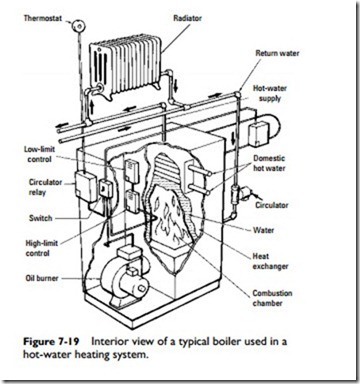Hot-Water Boilers
The boilers used in hot-water heating systems are made of cast iron or steel (Figures 7-19 and 7-20). The cast-iron boilers generally dis- play a greater resistance to the corrosive effects of water than the steel ones do, although the degree of corrosion can be significantly reduced by chemically treating the water.
Gas (natural or propane), oil, electricity, or solid fuels have been used as the energy source for heating the water in boilers. Multi- fuel boilers are designed to allow switching between two different fuels. Some manufacturers will provide conversion devices for switching from one type of gas to the other (Figure 7-21). Changing from coal to oil or gas is a frequent conversion provided for by conversion burners (see Chapter 16, “Boiler and Furnace Conversions”).
Never purchase an uncertified boiler. All certified boilers are approved by one of several organizations that have assumed this responsibility. For example, many boilers are certified by either the
Institute of Boiler and Radiator Manufacturers (cast-iron boilers) or the Steel Boiler Institute (steel boilers). They will be stamped I = B = R or SBI, respectively. Figure 7-22 illustrates some of the certifications you will encounter on boilers.
Steam boilers can also be used in hot-water heating systems, but a heat exchanger must be incorporated into the system to transfer the heat from the steam to the hot water that flows through the heat-emitting units in the rooms.
